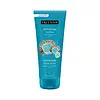What's inside
What's inside
 Key Ingredients
Key Ingredients

 Benefits
Benefits

 Concerns
Concerns

 Ingredients Side-by-side
Ingredients Side-by-side

Water
Skin ConditioningBentonite
AbsorbentKaolin
AbrasivePropylene Glycol
HumectantMacrocystis Pyrifera Extract
Skin ConditioningSea Salt
AbrasiveLavandula Angustifolia Oil
MaskingCitrus Aurantium Bergamia Fruit Oil
MaskingTocopherol
AntioxidantCaprylic/Capric Triglyceride
MaskingMontmorillonite
AbsorbentMagnesium Aluminum Silicate
AbsorbentTitanium Dioxide
Cosmetic ColorantDisodium EDTA
Sodium Polyacrylate
AbsorbentDiazolidinyl Urea
PreservativeMethylparaben
PreservativePropylparaben
PreservativeMethylchloroisothiazolinone
PreservativeMethylisothiazolinone
PreservativeParfum
MaskingButylphenyl Methylpropional
PerfumingLinalool
PerfumingHydroxyisohexyl 3-Cyclohexene Carboxaldehyde
MaskingCI 42090
Cosmetic ColorantWater, Bentonite, Kaolin, Propylene Glycol, Macrocystis Pyrifera Extract, Sea Salt, Lavandula Angustifolia Oil, Citrus Aurantium Bergamia Fruit Oil, Tocopherol, Caprylic/Capric Triglyceride, Montmorillonite, Magnesium Aluminum Silicate, Titanium Dioxide, Disodium EDTA, Sodium Polyacrylate, Diazolidinyl Urea, Methylparaben, Propylparaben, Methylchloroisothiazolinone, Methylisothiazolinone, Parfum, Butylphenyl Methylpropional, Linalool, Hydroxyisohexyl 3-Cyclohexene Carboxaldehyde, CI 42090
Sucrose
HumectantPropylene Glycol
HumectantCharcoal
AbrasiveKaolin
AbrasiveMusa Sapientum Fruit Extract
Skin ConditioningNelumbo Nucifera Extract
Skin ConditioningZingiber Officinale Root Extract
MaskingPsidium Guajava Fruit Extract
AstringentCymbopogon Schoenanthus Extract
Skin ConditioningCarica Papaya Fruit Extract
Skin ConditioningMaranta Arundinacea Root Extract
SmoothingRubus Idaeus Fruit Extract
AstringentSantalum Album Extract
CleansingMacrocystis Pyrifera Extract
Skin ConditioningNasturtium Officinale Extract
PerfumingAleurites Moluccanus Extract
AstringentLavandula Angustifolia Oil
MaskingCarbomer
Emulsion StabilisingPhenoxyethanol
PreservativeParfum
MaskingCI 77491
Cosmetic ColorantSucrose, Propylene Glycol, Charcoal, Kaolin, Musa Sapientum Fruit Extract, Nelumbo Nucifera Extract, Zingiber Officinale Root Extract, Psidium Guajava Fruit Extract, Cymbopogon Schoenanthus Extract, Carica Papaya Fruit Extract, Maranta Arundinacea Root Extract, Rubus Idaeus Fruit Extract, Santalum Album Extract, Macrocystis Pyrifera Extract, Nasturtium Officinale Extract, Aleurites Moluccanus Extract, Lavandula Angustifolia Oil, Carbomer, Phenoxyethanol, Parfum, CI 77491
 Reviews
Reviews

Alternatives
Ingredients Explained
These ingredients are found in both products.
Ingredients higher up in an ingredient list are typically present in a larger amount.
Kaolin is a clay. It is used for oil control and to help minimize pores. Like other clays, kaolin has the ability to absorb excess sebum or oil. This can help clean out pores and mattify the skin.
Some types of kaolin may have exfoliating properties. When water is added to kaolin, it becomes a paste with small abrasive particles.
Most kaolin is a white color, but may be pink/orange/red depending on where it comes from.
The name 'kaolin' comes from a Chinese village named 'Gaoling'. Kaolin clay comes from rocks rich in kaolinite. Kaolinite, the mineral, has a silicate layered structure. Kaolinite is formed from chemical weathering of aluminum siilicate minerals.
Besides skincare, kaolin is commonly used to make glossy paper, in ceramics, toothpaste, and as medicine to soothe stomach issues.
Learn more about KaolinLavandula Angustifolia Oil is more commonly known as lavender essential oil. It is considered a fragrancing ingredient.
Lavender imparts a famous scent. While the smell is lovely, this ingredient and may sensitize skin in topical products. This is because about 85% of the oil is made up of linalool and linalyl acetate.
When exposed to air, these two compounds become strong allergens. This ingredient exhibits cytotoxicity at low concentrations; amounts of 0.25% have been shown to damage skin cells.
A study from Japan found this ingredient caused lavender sensitivity after widespread exposure.
Lavender essential oil has some antimicrobial, antibacterial, and anti-inflammatory properties. However, the cons of this ingredient may outweight the pros.
More research is needed to confirm lavender essential oil's effects when used in aromatherapy.
Lavandula Angustifolia is known as the English Lavender and famous for creating purple fields in Provence, France.
Learn more about Lavandula Angustifolia OilThis ingredient comes from a brown kelp called Macrocystis pyrifera. It is rich in antioxidants and can help hydrate skin.
Brown kelp are rich in unsaturated fatty acids and phlorotannins. Phlorotannins have been found to help with inhibiting melanin production and helping reduce the signs of aging due to their high antioxidant activity.
One study suggests phlorotannins may even have some sun protection factor due to their antioxidant activity. However, this ingredient should not replace your sunscreen.
Macrocystis pyrifera is made up of about: 60% carbohydrates, 10% protein, and 1.50% lipid content. The last 30% is kelp ash.
This kelp can be found in the southern hemisphere and north Pacific.
Learn more about Macrocystis Pyrifera ExtractParfum is a catch-all term for an ingredient or more that is used to give a scent to products.
Also called "fragrance", this ingredient can be a blend of hundreds of chemicals or plant oils. This means every product with "fragrance" or "parfum" in the ingredients list is a different mixture.
For instance, Habanolide is a proprietary trade name for a specific aroma chemical. When used as a fragrance ingredient in cosmetics, most aroma chemicals fall under the broad labeling category of “FRAGRANCE” or “PARFUM” according to EU and US regulations.
The term 'parfum' or 'fragrance' is not regulated in many countries. In many cases, it is up to the brand to define this term.
For instance, many brands choose to label themselves as "fragrance-free" because they are not using synthetic fragrances. However, their products may still contain ingredients such as essential oils that are considered a fragrance by INCI standards.
One example is Calendula flower extract. Calendula is an essential oil that still imparts a scent or 'fragrance'.
Depending on the blend, the ingredients in the mixture can cause allergies and sensitivities on the skin. Some ingredients that are known EU allergens include linalool and citronellol.
Parfum can also be used to mask or cover an unpleasant scent.
The bottom line is: not all fragrances/parfum/ingredients are created equally. If you are worried about fragrances, we recommend taking a closer look at an ingredient. And of course, we always recommend speaking with a professional.
Learn more about ParfumPropylene Glycol is an odorless, colorless liquid. As a humectant, it helps skin retain moisture. It also aids in delivering active ingredients.
Another role of this ingredient is preventing a product from melting or freezing. Propylene glycol also adds antimicrobrial properties to a product, elongating product lifespan.
This ingredient is considered an organic alcohol and commonly added into both cosmetics and foods.
Those with sensitive skin or conditions may develop a rash when using this ingredient.
Learn more about Propylene Glycol